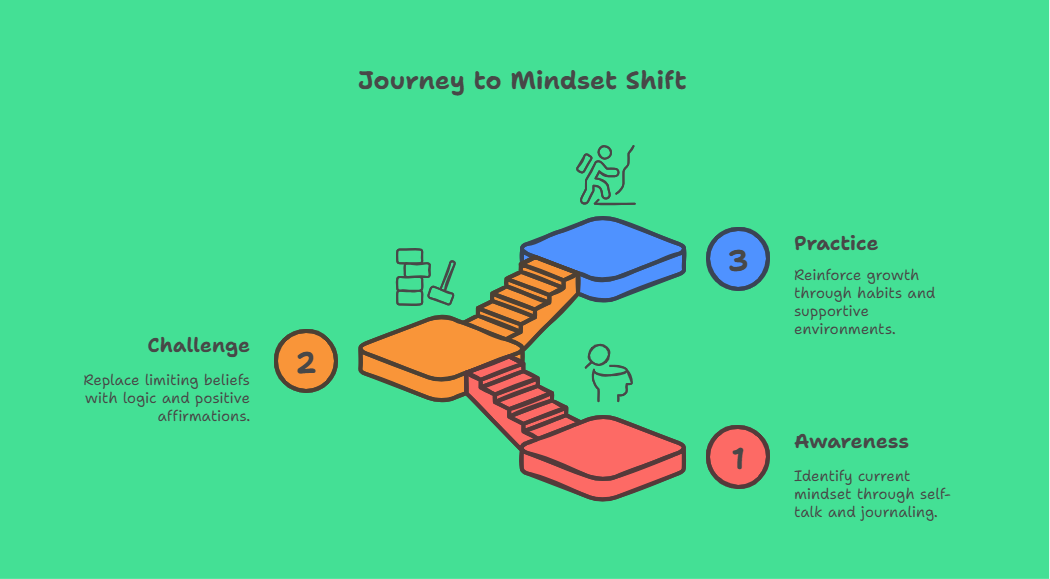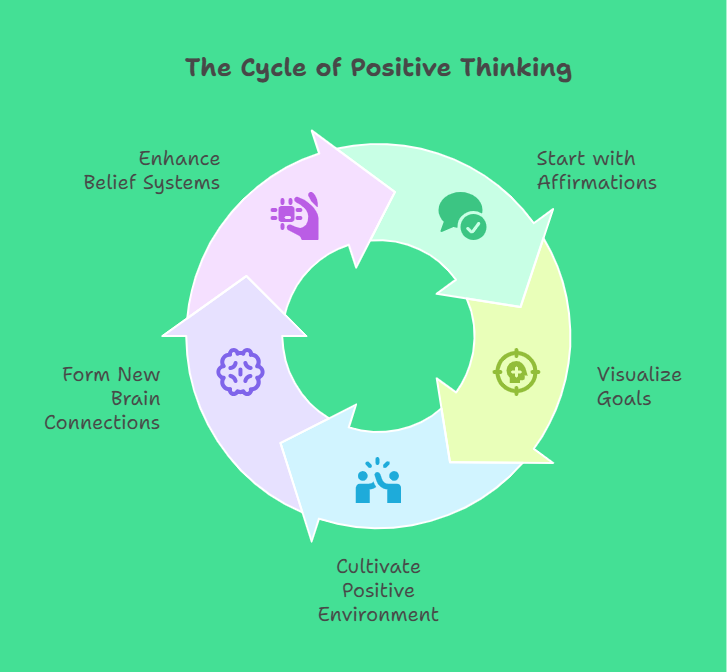Ever wondered why two people in the same situation achieve completely different outcomes? One might give up after failure, while the other bounces back stronger. The secret? Mindset. It’s that internal compass that decides whether you’ll sink or swim, fight or flight, give up or grow. And if you can control that mindset, you won’t retreat in any situation—instead, you’ll focus on how to overcome it.
In this article, we’ll break down why mindset is everything, the research backing it, powerful real-world examples, and a practical framework that can help you shift your own mindset for long-term self-improvement. Let’s dive into the key points.
Why Mindset Is Everything
Your mindset is the silent driver that either moves your life forward or holds it back on the path to success. It’s invisible to the eye, but it influences every decision and every step you take. Once you start believing, the journey of change begins. Let’s explore some key insights about it.
The Invisible Force Behind Success
Mindset is like the software running in the background of your brain. It influences every decision, reaction, and belief you hold. If you believe you can improve, you’re more likely to put in the effort. If you think success is only for the lucky, you probably won’t even try.
It’s not magic—it’s mental programming. Your mindset is like a lens that shapes how you view everything around you . And the clearer the lens, the better the vision.
Real-Life Examples of Mindset Power
Take Thomas Edison—over a thousand failed attempts before inventing the lightbulb. His famous quote? “I have not failed. I didn’t fail—I just discovered 10,000 methods that didn’t work.” That’s what a winning mindset looks like.
Take Oprah Winfrey, for example—she overcame a difficult past and rose to become a powerhouse in the world of media. Her belief in growth, learning, and resilience was the foundation.

What Is a Mindset?
A mindset is the set of beliefs and attitudes that shape how you see yourself and the world. It’s like mental software—guiding your thoughts, decisions, and reactions often without you realizing it.
The Two Mindsets That Define Your Growth
Psychologist Dr. Carol Dweck identifies two key types: Fixed Mindset and Growth Mindset
- Fixed Mindset: Believes abilities are static. Avoids challenges, fears failure, and often gives up easily.
- Growth Mindset: Believes skills can improve with effort. Embraces learning, feedback, and persistence.
How Your Belief System Shapes You
Your belief system isn’t just what you believe about the world—it’s what you believe about yourself. If deep down you think “I’m not smart,” that belief creates a ceiling. But if you say, “I can learn,” your ceiling becomes a launchpad.
The Science Behind Mindset and Self-Improvement
Mindset is not just belief or motivation—there’s science behind it. How you think has a direct impact on how your brain works. Surprisingly, science says that if you want to change yourself, your brain is ready to do it.
Neuroplasticity: Your Brain Can Change
The human brain is incredibly adaptable. This concept, called neuroplasticity, means your brain forms new connections as you learn and grow. According to research by Dr. Michael Merzenich, practicing new skills or thinking patterns can physically rewire the brain.
So yes—your brain listens when you believe in growth.
Research That Proves Mindset Matters
Dr. Carol Dweck’s study at Stanford University found that students who believed intelligence could be developed performed better academically. They bounced back from setbacks and even showed improved grades compared to students with a fixed mindset.
Reference: Dweck, C. S. (2006). Mindset: The New Psychology of Success.
The 3-Step Framework to Shift Your Mindset
Shifting your mindset isn’t some overnight miracle—it’s a gradual journey. With the right guidance and conscious practice, anyone can change their way of thinking.
We act the way we think, so changing the foundation of our thinking will change our results.
This change starts with understanding your thoughts, then challenging them, and building new ones. You can change your mindset if you want to—it just takes a little effort and patience.
In the following three steps, you can begin your journey of mindset shift—toward a thoughtful, lasting change. If you want an in-depth guide on this topic, here’s a detailed article on how to change your mindset that can support your growth.

Step 1: Awareness – Identify Your Current Mindset
Start by observing your self-talk. Do you ever catch yourself saying, “I’m just not good at math” or “I can’t ever seem to get this right”? That’s a fixed mindset sneaking in. Awareness is the first step to change.
Journal your beliefs. Write down the thoughts that limit you. Bring them to the surface—only then can you begin to reshape them.
Step 2: Challenge – Replace Limiting Beliefs
For every limiting thought, challenge it with logic and evidence. “I failed” becomes “I learned something valuable.”
Replace “I can’t” with “I can’t yet.” This small word adds possibility and opens a mental door. Build mental arguments that support your growth.
Step 3: Practice – Reinforce Growth Through Habits
Repetition rewires the brain. Use positive affirmations daily. Read books or tune into podcasts that nurture a growth mindset.
Surround yourself with people who have empowering mindsets. Growth thrives in the right environment.
The Success Mindset: How High Achievers Think
Successful people don’t do things differently—they think differently. They view failure not as a setback, but as a chance to grow and learn. They know that mindset is what ultimately makes the difference. Let’s see how world-class individuals like Serena Williams and Elon Musk have used this mindset to make the impossible possible.
Case Study: Serena Williams and Relentless Belief
Serena Williams didn’t become a tennis legend overnight. She trained in poor courts, battled injuries, and faced public scrutiny. But her mindset was unwavering: she believed she could improve.
She once said, “I really think a champion is defined not by their wins but by how they can recover when they fall.” That’s mindset over mechanics.
Case Study: Elon Musk’s Unshakable Vision
Love him or hate him, Elon Musk’s mindset is otherworldly—literally. While most thought reusable rockets were science fiction, Musk believed in it so deeply he poured millions into failed launches.
Now? SpaceX is a multi-billion-dollar game-changer. His belief didn’t guarantee success, but it guaranteed the possibility of success.
How Positive Thinking Rewires Your Brain
Positive thinking isn’t only about boosting your mood—it can actually reshape your brain. When you start to see yourself as full of potential, your brain forms new connections in that direction.
For those who struggle with overthinking, the journey to building a positive mindset can start by learning techniques to stop overthinking.
Good thoughts, confident statements, and an inspiring environment—these three ingredients combine to create a mental framework that helps you improve every day.

Affirmations and Visualization Techniques
Daily affirmations like “I am capable of growth” are more than words—they’re mental conditioning. Visualization, used by Olympic athletes and CEOs alike, strengthens belief by painting a mental image of your goals.
Your brain often doesn’t distinguish between visualization and reality—use that to your advantage.
Environment and Influence on Belief Systems
Your surroundings can either fertilize or poison your mindset. Negative people breed doubts. Growth-minded communities push you to rise.
Be intentional about who and what you surround yourself with—your belief system depends on it.
All in all of this article
In the end, mindset is everything—because it defines how you experience the world. It determines how you respond to failure, success, and every challenge in between. Through awareness, belief, and action, you can cultivate a mindset that supports your goals and dreams.
And remember: your mind is your most powerful tool. Use it wisely. Train it daily. And never forget—you’re one thought away from a breakthrough.
I hope I have covered everything on this topic. If you have any more questions, please let me know in the comments or drop me a line on my contact page. If this article resonated with you, go ahead and share it with your friends on social media. I hope your mindset changes very soon.
Frequently Asked Questions (FAQs)
1.What does ‘mindset is everything’ mean?
It means your mindset influences how you perceive challenges, respond to failure, and pursue goals.
2.Why is mindset so important for success?
A growth mindset encourages resilience, effort, and persistence, all key factors in achieving success.
3.What’s the difference between fixed and growth mindsets?
Fixed mindsets believe talent is innate; growth mindsets believe skills are developed.
4.Can I change my mindset at any age?
Yes—thanks to neuroplasticity, your brain can adapt and grow at any stage of life.
5. Are there scientific studies supporting mindset theories?
Yes, Dr. Carol Dweck’s research at Stanford is a foundational source in mindset psychology. You can also explore this detailed academic guide on Mindset Theory published by Washington State University to dive deeper into the scientific framework behind it.
6.What are affirmations and do they really work?
Affirmations are positive statements that help rewire thought patterns when used consistently.
7.How do I identify a limiting belief?
Listen to your self-talk—if it sounds absolute and negative, it’s likely limiting.
8.Can mindset help with mental health?
While not a cure-all, a positive mindset can reduce stress and improve emotional resilience.
9.What role does the environment play in shaping mindset?
A supportive environment reinforces growth; a toxic one can stunt it.
10.Who are some examples of people with a strong mindset?
Elon Musk, Serena Williams, Oprah Winfrey, and Michael Jordan are great examples.
How long does it take to change a mindset?
It varies, but consistent effort over weeks can begin reshaping thought patterns.
11.Does mindset affect relationships too?
Absolutely—people with growth mindsets handle conflict and communication more constructively.
12.What book can I read to learn more about growth mindset?
Mindset: The New Psychology of Success by Carol S. Dweck is the definitive read.

